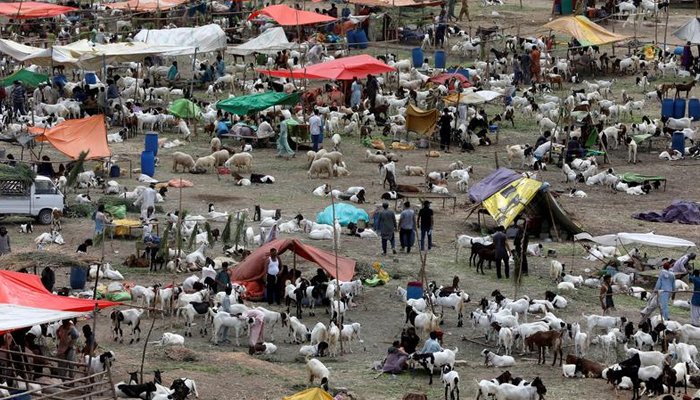- NCOC wants 2-3 prayers organised at one venue.
- Authority makes masks compulsory for prayers.
- Says slaughtering sites must be kept away from residential areas.
ISLAMABAD: The National Command and Operation Centre (NCOC) on Tuesday issued fresh guidelines for Eid ul Adha, urging people to follow the issued SOPs as coronavirus cases climb across the country.
COVID cases witnessed a spike in the mid of June, with officials fearing that the infections would spread further due to shopping and the celebrations leading up to Eid ul Adha.
Eid ul Adha will be observed on July 10 and on this festival, animals are sacrificed, which increases human contact, thereby increasing the chance of the event being a super spreader.
In light of this, the NCOC has issued fresh guidelines for the public to follow.
Eid ul Adha prayers
- Eid UI Adha prayers should be organised in open spaces under stringent COVID protocols. In case of any compulsion to offer the prayers inside mosques, then all windows and doors should be kept open for ventilation to minimise the chances of disease spread.
- Preferably 2-3 Eid prayers should be organised at one single venue with staggered timings to allow maximum people to offer prayers with COVID-19 protocols.
- All ulemas leading Eid prayers should be sensitised to keep sermons and khutbaas short so that people remain present in the prayer venues for a brief duration.
- Efforts should be made to discourage sick, elderly and young children from attending Eid prayers.
- Under no circumstances should people be allowed to enter the prayer venue without a proper face mask.
- There should be multiple entry and exit points at the prayer venue to avoid jumbling up of individuals/prevent transmission of disease.
- Venue organisers should ensure the availability of a sufficient quantity of hand sanitisers at the entry points. It should be mandatory for all coming for prayers to use sanitisers before entering the venue.
- To ensure social distancing protocols, venue organisers to ensure prominent marking (6 feet apart) to allow sufficient space/distance between individuals.
- People should be encouraged to perform abulution at home before coming for the prayers and also bring their own prayer mats to the venue.
- Efforts should be made to sensitise people to refrain from embracing and handshaking after the prayer to avoid chances of disease transmission.
- There should not be any gathering at the prayer venue before the prayer and people should be asked to disperse immediately after the prayer.
Management of qurbani
- Efforts will be made to promote and encourage central/collective qurbani through various public, private and community organisations, while ensuring adherence to COVID-19 protocols of mask-wearing, social distancing and avoidance of crowd, etc.
- Continuous engagements will be ensured by provinces with ulemas for encouraging people for central/collective and online qurbani.
- Individual qurbani may be allowed, however collective qurbani will be preferred.
- Provinces to initiate awareness campaigns to educate the masses on the possible spread of COVID during meat distribution, therefore, care must be exercised in meat handling/distribution.
- The site of slaughtering should be away from residential areas and preferably in open/vast spaces.
- Crowding at slaughtering should be avoided and a minimum number of persons should be allowed to be present at the site.
- Any other measure as deemed appropriate to contain disease spread.
COVID-19 report
The National Institute of Health (NIH) data from today morning showed that the COVID-19 positive ratio in the country had declined to 3.45%.
A day earlier, a 4.61% COVID-19 positive ratio was recorded in the country with 675 cases.
In the last 24 hours, a total of 18,950 diagnostic tests were conducted, out of which 653 samples came back positive, the data showed.
On a positive note, the country reported no deaths in the last 24 hours from COVID-19.


 Entertainment2 days ago
Entertainment2 days ago
 Latest News2 days ago
Latest News2 days ago
 Latest News2 days ago
Latest News2 days ago
 Latest News2 days ago
Latest News2 days ago
 Latest News2 days ago
Latest News2 days ago
 Entertainment2 days ago
Entertainment2 days ago
 Latest News2 days ago
Latest News2 days ago
 Business23 hours ago
Business23 hours ago



















